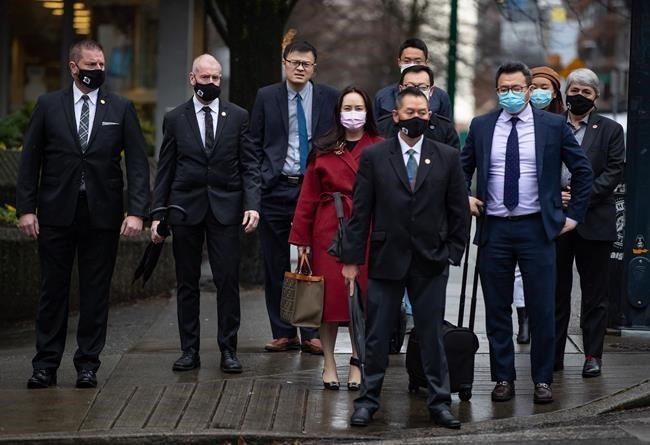VANCOUVER — Lawyers for Huawei executive Meng Wanzhou allege the United States' legal case against her violates common international law and the extradition proceedings against her should be stayed.
In a notice of application filed with the B.C. Supreme Court, Meng's defence team outlines a new, fourth branch of argument for why they believe she was subjected to an abuse of process and should be released.
"The extradition proceedings against her constitute an abuse of the Canadian judicial process such that the proceedings should be stayed," the notice says.
Meng, who is Huawei's chief financial officer, is wanted on fraud charges in the United States that both she and Huawei deny.
She is alleged to have misrepresented the relationship between Huawei and Skycom, causing HSBC to violate U.S. sanctions against Iran by processing American dollars derived from Iran-based business through the U.S. banking system.
The court documents say international law doesn't allow a government to criminalize the conduct of someone who isn't a citizen outside its own jurisdiction where there is no genuine connection to that country.
They say HSBC is incorporated in the United Kingdom, Meng is a Chinese national and the alleged misrepresentations on sanctions were made in Hong Kong.
The lawyers argue there is no connection between Meng's alleged conduct and the United States.
The bank's clearing of U.S. dollars was not a "reasonably foreseeable consequence" of Meng's actions, they argue.
"None of (Meng's) alleged conduct occurred in whole or in part in the U.S., nor did it have any effect there," the documents say.
Consequently, the United States' assertion of jurisdiction is unlawful, they say.
"(Meng's) prosecution is premised on foreign financial institutions using U.S. correspondent banking services in violation of U.S. sanctions, for which (Meng) is not responsible," the documents say.
"Such charges give effect to U.S. economic policy abroad and are thus contrary to (common international law)."
As common international law is part of the law of Canada, it would be an abuse of process of the B.C. Supreme Court and compromise the integrity of the Canadian judicial system to move forward with the case, they argue.
Canada's attorney general has not yet filed a response.
Meng's lawyers have previously outlined three other branches of argument they will make next year to support an abuse of process claim.
They allege Meng was used as a political pawn by U.S. President Donald Trump, that her questioning and arrest at Vancouver's airport in 2018 were unlawful and that the U.S. misrepresented its case against her to Canadian officials.
This report by The Canadian Press was first published Dec. 18, 2020.
Amy Smart, The Canadian Press



